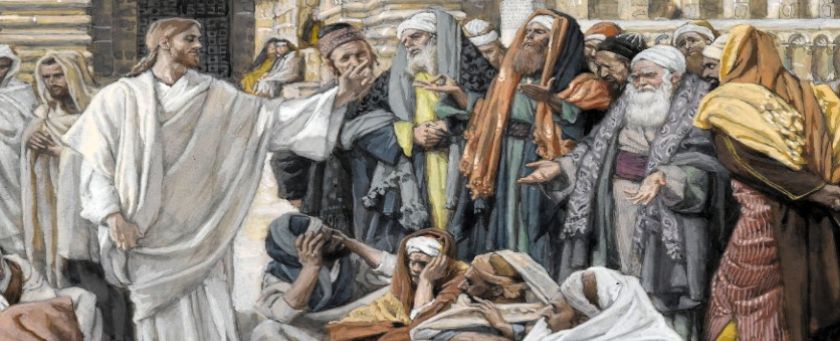Those Who Keep the Commandments Live in the Presence of the Lord
Twenty-Second Sunday in Ordinary Time, Year B

(Audio recorded live, 28 August 2021)
Readings:
Dt. 4:1-2, 6-8; Ps. 15; Jas 1:17-18, 21b-22, 27; Mk 7:1-8, 14-15, 21-23
Moses asked the Israelites: “For what great nation is there that has gods so close to it as the LORD, our God, is to us whenever we call upon him?” This is a rhetorical question because the people all knew the answer. They had witnessed the many signs that freed them from slavery in Egypt, they followed the pillar of cloud by day and the pillar of fire by night, and they ate the manna in the desert. These were all signs of the Lord’s closeness to his people, yet, they did not have what we have today; they did not have the Eucharist. Christ had not yet come. So, they focused on what they did have, the Law. Again, Moses asks, “[W]hat great nation has statutes and decrees that are as just as this whole law which I am setting before you today?” It is another rhetorical question, for anyone who reads the commandments and understands would have to agree that they are rooted in Divine Justice.
Many tend to look at justice as fairness, but this is a very human way of looking at it. As humans, we seek to ensure that everyone is treated fairly, that there is equity among friends, but the commandments yoke us to something far greater, the commandments yoke us with God’s justice. Whenever we keep the commandments, we participate in God’s justice. Whenever we break the commandments, we fail to do what is right and just. How would anyone ever know what is truly right and just if God did not first show us? This is the significance of the commandments, and the importance of keeping them.
Our Psalm is an excellent reminder of how to remain in the presence of the Lord. Those who walk blamelessly and do justice, who think the truth in their hearts, and slander no one; those who harm no one, or hold grudges against their neighbor; those who fear the Lord, they will live in the presence of the Lord. And by keeping the commandments, we participate in God’s justice.
St. James takes us a step further than the Law. He focuses our attention on the word of truth, which came to us through Jesus Christ. This word of truth was imparted on each of us at baptism and continues to lead and guide us, like a shining light in a world of darkness. But that word is not just something we listing to with our ears, it is something we internalize and put into action.
Jesus says, “blessed are those who hear the word of God and observe it.” (Lk. 11:28). To observe means to put it into action, to let this word inform how we live. As St. Peter said to Jesus in last week’s Gospel, “Master, to whom shall we go? You have the words of eternal life.” This word gave the Law to Moses on Mt. Sinai; this word spoke through the prophets; and today, this word speaks to us of the importance of observing it.
In our Gospel, the Pharisees take issue with Jesus’ disciples for not following the traditions of the elders. The Pharisees were so big on keeping the Law, they even invented a bunch of their own laws to be observed. Jesus, who is the giver of the Law, calls them hypocrites for neglecting the commandments in favor of their own laws. They were clinging to human traditions rather than to the Word of God.
What about us? How closely are we observing the commandments? Or are we more into human traditions? I am sure many of us are proud to be law abiding citizens, but are we law abiding citizens of the kingdom? Jesus shows us what evil can come from within. Can we say that we avoid all those evils from within our own hearts? Perhaps we might revisit this gospel passage throughout the week and take inventory. As James says, “Be doers of the word and not hearers only….” So, let us do the work that we have all been called to. And as we do the work, we will live in the presence of the Lord.
The presence of the Lord comes to us through our observance of the Law, but in a most spectacular way, through the Most Holy Sacrifice of the Mass. This is our greatest prayer, because through our worship, Jesus becomes present to us—more present to us than to the Israelites in the desert. May the communion we share today keep us united in Christ, and rooted in the truth of his word.





Share this post
Twitter
Facebook
Pinterest
Email